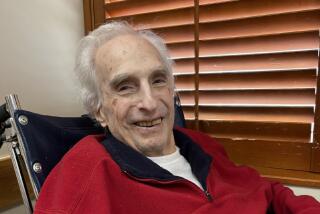Bingham Ray dies at 57; leading force in independent films
Bingham Ray, the co-founder of October Films, one of the top independent film distribution companies of the 1990s, and a former president of United Artists who was a leading force in independent films for more than two decades, died Monday. He was 57.
Ray, who was named executive director of the San Francisco Film Society in November, died in a hospital in Provo, Utah, after suffering a stroke last week while attending the Sundance Film Festival in Park City, said Sarah Eaton, a spokeswoman for the family.
“We lost a true warrior for independent voice today with the passing of Bingham Ray,” Sundance founder Robert Redford said in a statement. “He was a valued member of the Sundance family for as long as I can remember, and he is responsible for mentoring countless seminal storytellers and bringing their work to the world.”
A onetime manager and programmer at the Bleecker Street Cinema in New York’s Greenwich Village in the early 1980s, Ray co-founded October Films in 1991 with Jeff Lipsky in Lipsky’s garage in Sherman Oaks.
Six months after its first release, Mike Leigh’s “Life Is Sweet,” the company had raised capital and opened its doors in New York City. Ray served as co-president until the company’s sale to USA Networks in 1999.
During his years with October Films, Ray distributed films such as Leigh’s “Secrets & Lies,” Lars von Trier’s “Breaking the Waves,” John Dahl’s “The Last Seduction,” Robert Duvall’s “The Apostle,” David Lynch’s “Lost Highway,” Robert Altman’s “Cookie’s Fortune” and Jim Jarmusch’s “The Year of the Horse.”
“He was very beloved by the filmmakers he worked with and very dedicated to preserving their vision in bringing their films to the marketplace,” John Schmidt, one of Ray’s former partners in October Films, said Monday.
“He was a man whose passion for film just embodied everything good about our industry,” Schmidt said. “He did it with tremendous drive and passion, not because he wanted to become a millionaire and not because he wanted to be a big shot, but because it was in his heart and soul.”
After leaving October Films in 1999, Ray continued to be a familiar presence at film festivals, where he served on judging panels. But after nearly dying in a traffic accident in 2000, he later told the New York Times, “I realized where my place really is.”
In 2001, after six months as president of New York-based Crossroads Films, Ray was named president of United Artists, the specialty films division of Metro-Goldwyn-Mayer Inc.
During his nearly 2 1/2 years at UA, Ray bought Michael Moore’s “Bowling for Columbine,” which won the Academy Award for best feature documentary in 2003.
In a Twitter message on Monday, Moore said he would “deeply miss” Ray. “He bought & distributed Bowling for Columbine when no one else would. He stood by me all the way.”
Among other films the company acquired/and or produced during Ray’s tenure are Danis Tanovic’s “No Man’s Land,” an Oscar winner for best foreign language film; “Nicholas Nickleby,” “Jeepers Creepers” and its sequel, and “Pieces of April.”
When Ray resigned from UA in 2004, the Hollywood Reporter reported that sources close to the situation said that he and MGM executives “often clashed over the types of films that Ray chose to champion, with the studio regarding his taste as too esoteric and arty.”
Independent producer Jonathan Dana described Ray on Monday as being “one of a kind.”
“I don’t think there is anybody more passionate or dedicated or more courageous than Bingham in terms of what he believed in and what he would fight for and who he would challenge if it meant moving something forward that he believed in,” Dana said.
“He’s a true testament to what we all do in the independent film world.”
Ray, who was born Oct. 1, 1954, in Bronxville, N.Y., told the San Francisco Chronicle in December that his father, a civil engineer, taught him to love movies in elementary school: His reward for finishing his homework was being allowed to watch movies on TV with his dad.
His film education continued at Scarsdale High School, where he took a film class that introduced him to foreign films and prompted him to make his first film with a Super 8 camera provided by the teacher. He graduated with a degree in theater arts and speech from Simpson College in Iowa.
After his stint at the Bleecker Street Cinema, Ray worked for New Yorker Films, the Samuel Goldwyn Co. and Alive Films before co-founding October Films.
He joined L.A.-based production company Sidney Kimmel Entertainment in 2007 and over the next three years served as president of Kimmel Distribution and president of creative affairs.
Before being named executive director of the San Francisco Film Society, he served as the first-run programming consultant to the Film Society of Lincoln Center, executive consultant to the digital distribution company SnagFilms and adjunct professor at New York University’s Tisch School of the Arts.
Ray is survived by his wife, Nancy King; their children, Nick, Annabel and Becca; and his sisters, Susan Clair and Deb Pope.
Times staff writer Nicole Sperling contributed to this report.
More to Read
Start your day right
Sign up for Essential California for the L.A. Times biggest news, features and recommendations in your inbox six days a week.
You may occasionally receive promotional content from the Los Angeles Times.




















































